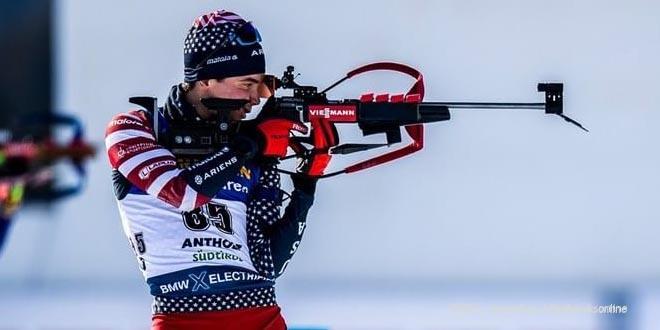Skiing and shooting, M.A. alums represent Team USA in little-known winter sport
In a cold sweat, with hearts racing, the skiers lay on their stomachs, .22-caliber rifles in hand, waiting for the perfect moment to shoot, between breaths. Breathe-breathe-hold-shoot. Among these world-class skiers, Minnehaha alumni Jake Brown (’10) competes to win.
At Minnehaha, Brown ran cross-country in the fall, skied on the Nordic team in winter, and ran track in the spring. As a senior, he captained all three teams and broke the school’s 5K record.
Today, he’s a biathlete on the U.S. national team and is in position to compete in the 2022 Winter Olympics in China. His youngest brother, Luke, followed in his footsteps as a Redhawk and also represents Team USA in this unusual sport.
“My brother has been a big source of inspiration for me throughout my athletic career,” said Luke Brown. “Whether that was running cross-country for Minnehaha or competing on the ski team, I learned a lot from Jake and then would try to beat his times, records, places … which, of course, was difficult to do.”
As they travel with Team USA, the family connection remains strong.
“I really am consistently inspired by each member of my family for a variety of reasons,” Luke Brown said. “Jake’s work ethic, perspective, and athletic success are inspiring.”
The Winter Olympics consist of many sports: hockey, figure skating, and downhill skiing are mainstream features; snowboarding, bobsledding, speed skating, and even ski-jumping get attention every four years.
Hidden under the surface of these events are unusual sports like luge, skeleton, and curling. And then there’s biathlon, a sport that combines full-speed nordic skiing with total-calm rifle shooting.
“Shooting is very opposite of having to push yourself in skiing,” said Jake Brown. “[Biathlon] is two things that shouldn’t really be combined, but that’s what makes it a very difficult but exciting sport.”
Biathlon began in 1924 at the first Winter Olympics, in Chamonix, France, as a military patrol. It has been included in the Winter Olympics since. There are five events for men and five for women, as well as one mixed relay event.
Biathlon also has an annual World Cup circuit in Europe. The sport has taken the Brown brothers to countries such as Italy, Finland, Sweden, Norway, Germany, Austria, and France. Most recently they traveled to Slovenia and were recently racing in the Czech Republic.
In the longest event, men ski 20 km and women ski 14 km. (The graphic shows a course for a 15 km men’s race at a typical World Cup event.)
Some of the races are interval or individual start, and some are a mass start.
Skiers race with a .22-caliber rifle on their back. It is strapped on with a backpack-like harness. Depending on the event, biathletes will ski a loop of track and either stop to shoot two or four times during the race. For example, in the shorter 10 km race, racers ski a 3.3-kilometer loop, then shoot their five shots.
The first half of all the shooting stages are lying down. The second half is always standing.
When approaching the shooting points, skiers choose one of 30 shooting mats on the firing line, get into position and attempt to shoot five tiny black dots.
As skiers hit each target, a small white paddle flips upwards, signifying a successful shot. If a skier misses a shot, they either ski a 150-meter penalty loop or get one minute added to their final time, therefore it is crucial that they hit the targets.
“The most important thing to do when shooting is focus mentally,” said Jake Brown. “It is important to be able to mentally calm yourself.”
Training for biathlon involves learning techniques to control body and mind.
“The physical thing that I do, to try to make sure that I’m ready to shoot, is to give myself a lot of oxygen,.” he said. “I usually hyperventilate, really try to get a lot of oxygen into my body. Hopefully, I do this without getting out of breath, because the moment you start to get out of breath, things get tough.”
Beyond high school, the Browns have worked on mental skills that can translate into success in almost any sport.
“I think a really important skill to have in biathlon and sports, in general, is the ability to have a short memory and to not dwell on the past,” said Jake Brown.
Learning from rough experiences is as important as learning from success.
“If you have a really bad race, you have to be able to come back the next day and perform, you have to put that behind you,” he said. “If you have a really bad shot, you have to be able to put that behind you and focus on the next one.”
For Jake, one of the next races could be in the Olympic Games.
“I missed the Olympics in 2018 by a couple of spots,” said Jake Brown. “We had a couple of guys retire, and I started to improve a lot in 2019, so I’ve been on the Olympic team. Going forward, you just never know what happens. I’ve been very thankful to make three World Championships, so we’ll see what happens next year with COVID and with the Olympics, and hopefully, I can keep this level up.”

